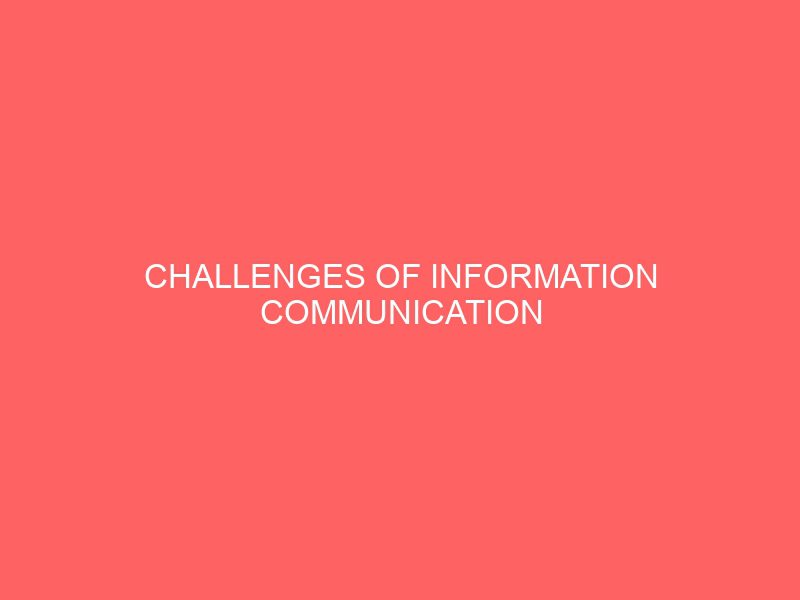Description
CHAPTER ONE
INTRODUCTION
1.1 Background to the Study
Firms ought to understand the underlying sources of threats in its industry. These threats result from competitive pressure from other firms in the industry. Understanding these forces is imperative if the firm is to formulate appropriate strategies to respond; which boils down to the firm selecting products, or services to offer and the markets in which to offer them. This makes strategy a deliberate plan of action that the business will adopt in order to develop and grow its competitive advantage. There has been an increasing reliance on Information Communication Technology (ICT) systems for managing business processes as well as driving business strategy across the banking industry. Firms have no option but to comply with globalization trends and to find a fit between globalization and organization strategies. The firms in the banking Sector continue to face a myriad of challenges, from globalization, competition, volatile market dynamics, competition from both bank and non-bank institutions all seeking more innovative ways to add value to their services.
Birch & Young (1997) argues that consumers look for products and services that are convenient and efficient to attain. They also seek for a wide array of products to choose from at competitive rates and which offer maximum returns. Customers have become more sensitized to expect better customer service standards, better products and services as a result of the internet. Banks have to adopt strategies that would ensure their profitability and resilience against the forces that determine industry competition.
This study revolves around three theories, the first being the industrial organization (IO) theory which emphasizes the influence of the industry environment upon a firm. The second is the resource-based theory, which views performance primarily as a function of a firm?s ability to utilize its resources. This theory focuses on the specific organization with respect to the competitive environment. The third is the innovation diffusion theory which is concerned with how an innovation adopter?s perception of the characteristics of an innovation impacts his or her decision to adopt it. This affects all users of the innovation, from the employee adoption of the innovation to the customer.
1.2 Objective of the study
The study was driven by the two objectives below:
(i) To establish the ICT challenges facing First Bank of Nigeria in achievement of sustainable competitive advantage.
(ii) To determine the strategies adopted by the First Bank of Nigeria to cope with these challenges.
1.3 Statement of the Problem
Banks have to come up with competitive strategies in search of favourable competitive positions in the industry in order to adapt to the changed environment and attain competitive advantage. ?Electronic banking systems have become the main technology driven revolution in conducting financial transactions. Banks have made huge investments in telecommunication and electronic systems, users have also been validated to accept electronic banking system as useful and easy to use?, (Adesina & Ayo, 2010).
Organizations encounter a myriad of challenges towards achieving competitive advantage through the use of ICT. Current research shows that organizations are not able to sustain a competitive edge for a long time, (Wiggins & Ruefli, 2005). Increasing global and domestic competition, economic downturns and volatile financial markets have all added to the pressure on organizations to come up with effective responses to survive to counter this. As a result, each bank is developing a strategy unique to its corporate culture, leading to the industry being in a state of constant change. A number of researches have been undertaken in the banking sector. Gan et al. (2006) predicted that e-banking is necessary for banks to stay profitable in the future.
However, the lack of trust by customers on the systems, or online processes remained a barrier to growth in the adoption of e-banking services. Nitsure (2003) conducted his research on the challenges and opportunities of e-banking and concluded that e-banking substantially lowered the costs of transaction and service delivery and could possibly revolutionize the business of banking. He further explained that developing economies faced similar challenges of poor infrastructure, low literacy levels and poor penetration of information.
According to Agboola (2006) the Nigerian banks? adoption of ICT exceedingly impacted on the quality and content of banking operations and therefore presented a notably high potential for business process engineering of Nigerian Banks. The banks? failure to invest in ICT products in order to facilitate the convenience, speed and accuracy of banking operations would result in the banks losing out to their competitors. Ahmed & Islam (2008) observed that banks in developing countries were forced to choose between the two strategic alternatives of the level of sophistication of products and services offered and the choice of delivery channel in adopting e-banking services.
1.4 Research Questions
1. Does ICT enhance business survival in Nigeria?
2. What factors affect ICTs use in the Nigeria?
3. Did the customers have the ability to use ICT?
4. Is there high cost of acquisition of the ICT technology?
1.5 Significance of the Study
To scholars the research will open avenues for further research and analysis of various factors and challenges affecting the application of ICT enabled services in a developing economy. It will also enable researchers to adopt service oriented practices in understanding customer service delivery channels and satisfaction. To the banking world the study would assist in the understanding of the variables and effects of the ICT challenges and how they impact on the banks? success and performance. It will also enable the banks to draft possible policy guidelines in their institutions.
To the government, customers and stakeholders the study would pass on knowledge on the processes, especially the self-serving technologies and their impact to the industry and overall economy. The government can draft policy guidelines using the valuable information gathered. To the stakeholders, the study will reflect the image of the banking industry in terms of its responses to the challenges facing.
1.6 Scope of the Study
To scholars the research will open avenues for further research and analysis of various factors and challenges affecting the application of ICT enabled services in a developing economy. It will also enable researchers to adopt service oriented practices in understanding customer service delivery channels and satisfaction. To the banking fraternity the study would assist in the understanding of the variables and effects of the ICT challenges and how they impact on the banks? success and performance. It will also enable the banks to draft possible policy guidelines in their institutions.
To the government, customers and stakeholders the study would pass on knowledge on the processes, especially the self-serving technologies and their impact to the industry and overall economy. The government can draft policy guidelines using the valuable information gathered. To the stakeholders, the study will reflect the image of the banking industry in terms of its responses to the challenges facing ICT.
1.7 Operational Definition of Terms
The definition of some relevant terms in this study will aid the understanding of the study. This is in accordance with the quote of a Greek philosopher?s sayings that the beginning of any decision or argument lies in the clarification or definition of the relevant term – Aristotle in Iroegbu (2004)
Challenge: Problems
ICT: Information and Communication Technology
Understanding: the ability to perceive and explain the meaning or the nature of somebody or something.
Organization: a group of people identified by a shared interest or purpose.
Innovation: the act or process of inventing or introducing something new.
Banks: a business that keeps money for individual people or companies, exchanges currencies, makes loans, and offers other financial services.
Profitability: yielding a financial profit
Information: definite knowledge acquired or supplied about something or somebody.
Communication: the exchange of information between people, e.g. by means of speaking, writing, or using a common system of signs or behavior.
Technology: the study, development, and application of devices, machines, and techniques for manufacturing and productive processes.
1.8 Historical Background of the Study
First Bank of Nigeria, sometimes referred to as First Bank, is a Nigerian multinational bank and financial services headquartered in Lagos. It is the biggest bank in Nigeria by total deposits and gross earnings and operates a network of over 750 business locations across Africa, the United Kingdom and representative offices in Abu Dhabi, Beijing and Johannesburg set up to capture trade-related business between geographies. It specializes in retail banking and has the largest retail client base in Nigeria. In 2015, The Asian Banker awarded First Bank the Best Retail Bank in Nigeria award for the fifth consecutive year.
The Nigerian banking business operates nationally, with an active customer base of over 10 million, and employs over 7,000 staff. First Bank operates along four key Strategic Business Units (SBUs) ? Retail Banking, Corporate Banking, Commercial Banking and Public Sector Banking. It was previously structured as an operating holding company before the implementation of a non-operating Holding Company structure
As of December 2015, the Bank had assets totaling NGN3.9 trillion ($12.2B according to 2017 exchange rates). The Bank’s profit before tax for the twelve months ending 31 December 2015 was approximately NGN10.2 billion. First Bank?s ownership is diversified, with over 1.3 million shareholders. The bank was founded in 1894 and is Nigeria?s oldest bank. It converted to a public company in 1970 and was listed on the Nigerian Stock Exchange (NSE) in 1971. However, as part of the implementation of the non-operating holding company structure, it was delisted from the NSE and replaced with FBN Holdings Plc. in 2012. First Bank has been named “The Best Bank Brand in Nigeria” for five years in a row ? 2011, 2012, 2013, 2014 and 2015 ? by The Banker magazine of the Financial Times Group, and “Most Innovative Bank in Africa” in the EMEA Finance African Banking Awards 2014.
In 2010, the Central Bank of Nigeria revised the regulation covering the scope of banking activities for Nigerian banks. The universal banking model was discontinued and banks were required to divest from non-core banking businesses or adopt a holding company structure. First Bank opted to form a holding company, FBN Holdings Plc., to capture synergies across its already established banking and non-banking businesses. The new structure resulted in a stronger platform to support the Group?s future growth ambitions domestically and internationally.







